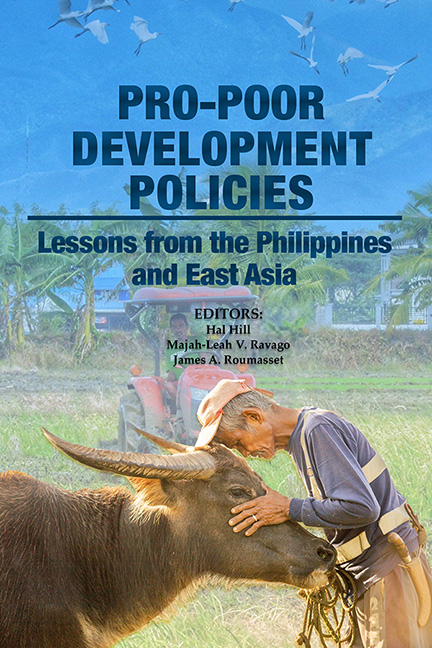Book contents
- Frontmatter
- Dedication
- Contents
- Figures, Tables and Boxes
- Foreword
- Foreword
- Message
- Preface and Acknowledgements
- About the Editors
- About the Contributors
- Acronyms
- Part 1 Introduction and Synthesis
- Part 2 Agricultural and Economic Development
- Part 3 Economic Policies for Achieving Targeted Levels of Living in the Philippines
- Part 4 Inequality and Economic Development
- Part 5 Competition Law and Policy
- Part 6 International Dimensions
- Index
3 - Trade Distortions as Constraints to Agricultural Development in East Asia
Published online by Cambridge University Press: 09 January 2024
- Frontmatter
- Dedication
- Contents
- Figures, Tables and Boxes
- Foreword
- Foreword
- Message
- Preface and Acknowledgements
- About the Editors
- About the Contributors
- Acronyms
- Part 1 Introduction and Synthesis
- Part 2 Agricultural and Economic Development
- Part 3 Economic Policies for Achieving Targeted Levels of Living in the Philippines
- Part 4 Inequality and Economic Development
- Part 5 Competition Law and Policy
- Part 6 International Dimensions
- Index
Summary
INTRODUCTION
It has been understood, at least since Plato’s Republic, that trade between two entities can be beneficial to both. The reason why that applies to countries was made very clear two centuries ago by Ricardo (1817) with his theory of comparative advantage. Yet most countries have restricted their international trade in products at various times. True, in the mid‑19th century following the repeal of Britain’s protective Corn Laws, the richest countries of Europe began opening their national markets, especially in farm goods, as they took more advantage of agricultural development opportunities in their colonies to secure food and fibre supplies. That globalization wave came to an end with World War I, and trade suffered further in the 1930s and early post-World War II. But during the lifetime of Arsenio M. Balisacan, empirical analyses of the effects of trade policies—including in the Philippines—have added to theoretical reasons for opening up to international trade. Arguably they have contributed to reforms of these policies since the 1980s, and thereby to the accompanying latest globalization wave.
This chapter surveys the findings of these empirical studies as they affect incentives in agricultural markets. A focus on policies affecting farm products is warranted because they adversely affect food security globally, and in particular the world’s poorest households, which are mostly found in rural regions of developing countries.
More specifically, the chapter traces the impacts of these trade, farm and food policy developments since the 1950s, particularly in East Asia. It does so by subdividing the period into the years to the mid‑1980s, which were characterized by anti-trade policies that added to the volatility of international food prices and to poverty and inequality in most developing countries, and the subsequent two decades, which saw the gradual undoing of these price- and trade-distorting policies. The chapter looks at both the extent of interventions insofar as they alter prices, and the market and welfare effects of these policies at home and abroad. During the most recent dozen years, international prices of farm products spiked and the government of the Philippines and of many other countries reacted in ways that aimed to insulate their domestic markets.
- Type
- Chapter
- Information
- Pro-poor Development PoliciesLessons from the Philippines and East Asia, pp. 75 - 94Publisher: ISEAS–Yusof Ishak InstitutePrint publication year: 2022



